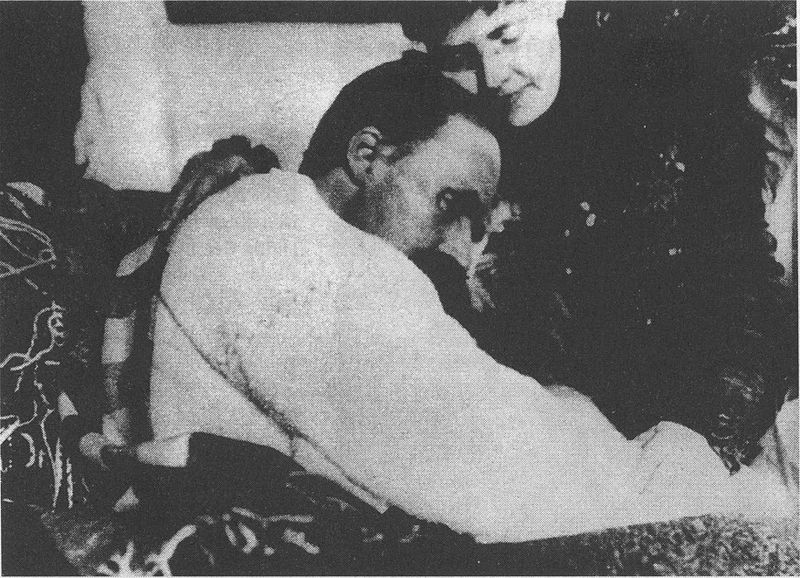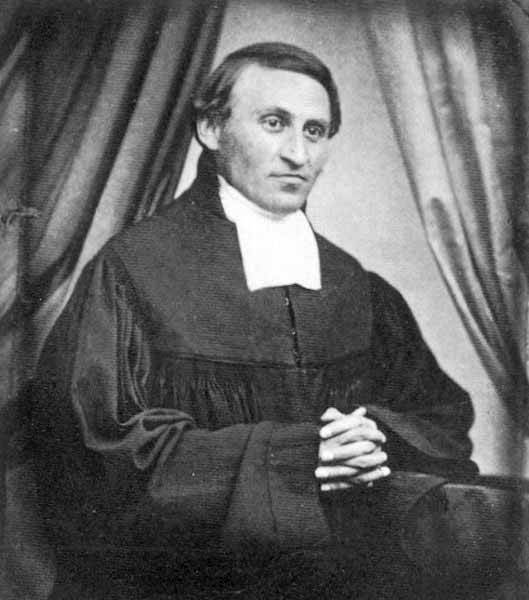Excerpted from Werner Ross’s Der ängstliche Adler
– Friedrich Nietzsches Leben (1980):
Carl Ludwig Nietzsche,
Nietzsche’s father
The boy does not remember the Röcken home dominated by women, but only the image of the father, idealized on par as it gradually fades out. The pious rural cleric remains completely safe from the uprising against Christianity, which would be the true mission of Nietzsche from his eighteen years. Since then, his father is for him an “ethereal angel.” One of the qualities that he has inherited from him is the kindness, the renunciation of revenge for nobility. So in the late self-portraiture of Ecce homo we read that, in case of offense, Nietzsche prohibits himself “any retaliation, any measure of defense.”
[Chechar’s note: Those who have read the passages of Alice Miller in The Untouched Key as to why Nietzsche went mad—just imagine a self-proclaimed Antichrist who, simultaneously, never defended himself before the father clergyman!—would treasure passages such as these.]
Another inherited quality is the love of music. In a postcard to Peter Gast [Heinrich Köselitz] of the time of Zarathustra an observation is included: “It is raining in torrents, music gets me away. I like that music and the way I like it is something I cannot explain based on my experiences: rather based on my father. And why should not…?”
The phrase is cut, but can be completed with another of Ecce homo in which he says: Why should not I continue to live in him and he in me after his untimely death?
And he was no less mystical in his later years, when he conceived the doctrine of eternal recurrence, so he could skip the generational order to become a descendant of Napoleon, Caesar or Alexander. But the same process also allowed otherwise: the mysterious identification with the father, either in the agonizing fear of premature death and madness, either in the gut, not even confessed to his friend Gast, that having survived the fateful thirty-third year of his life he would merge with his father to form a single figure with him.
The family was assured that Fritz (short for Friedrich) would be clergyman as the father. His mother, who was not limited to accompany him to the bed but every night carried him into it, panting said, “If you continue like this I’ll have to carry you up to bed until you study theology.” Fritz, meanwhile, was a precocious and obedient child; knew by heart passages of the Bible and religious songs so that their local school classmates called him the little shepherd. He was no friend of other children, and in school they laughed at him but then, at home, spoke wonders of the little sage.
Young Nietzsche, whose strange factions made one think of an owl, had an excellent performance. An anecdote belonging to the repertoire of Elisabeth [Nietzsche’s sister] tells us that, at one point, it started raining and as everyone ran from school to their homes, he continued to walk at a leisurely pace with the board over his hat and scarf on the blackboard. When Nietzsche got home was completely soaked. That why he had not run like the others? Well, because the school regulations say that, after school, children should go to their houses quietly and politely. The story seems credible; it was not normal behavior, but a show of obedience directed against his classmates’ behavior.
The little shepherd never tires of reciting pious maxims, edifying virtuous desires and prayers. Words like purpose, wise decision of God, beneficent hand of God, heavenly father come out of his lips with astonishing naturalness.
The strongest impressions were those that religious music gave Nietzsche. In the misty autumn evenings, the boy came sneaking into the cathedral to witness the rehearsals of the Requiem for the day of the dead; he was overwhelmed to hear the Dies irae and was deeply delighted with the Benedictus. It was not just a childish impulse that led him at fourteen, in Schulpforta, to write in all seriousness motets, chorale melodies and fugues and even try a Missa for solo, chorus and orchestra. At sixteen Nietzsche outlined a Miserere for five voices and, finally, began a Christmas oratory on which he worked for two years.
At seventeen, the son of the pastor received confirmation. His classmate Deussen, also a son of pastor says the two maintained a pious attitude, away from the world. They were willing to die immediately to go to meet Jesus. When his friend Wilhelm Pinder received confirmation, Nietzsche wrote: “With the promise you walk into the line of Christian adults who are considered worthy of the most precious legacy of our Savior, and through their enjoyment of life, achieve happiness of the soul.” Not even from the pastor’s pen would have come such pious words.
In High School Nietzsche had an “excellent” in religion. The commentary reports confirm that the student has shown, along with a good understanding of the New Testament, a keen interest in the doctrine of Christian salvation which he has easily and solidly assimilated, and is also able to express himself clearly on the subject.
♣
The above was extracted from one of the first chapters of Ross’ book. Unlike Curt Paul Janz, hundreds of pages later Ross only dedicates a few paragraphs to Nietzsche’s life after his breakdown. He writes:
Nietzsche’s biography ends in the early days of 1889, although his life was extended until August 25, 1900. Paralyzed and demented, he died of pneumonia.
On August 10, 1889 Nietzsche entered the psychiatric clinic of the University of Basel; a week later he is taken to the Jena University Clinic where he remains for about fifteen months, and on March 24, 1890 he is discharged in writing and sent home. Nietzsche remains under the care of his mother until her death in 1897. In July 1897 the sister purchases a Weimar villa, “Silberblick,” for the Nietzsche Archive and in it she installs the patient.
About the demented Nietzsche several persons issued reports: (1) Turin dentist, Dr. Bettmann, who with Overbeck brought Nietzsche to Basel; (2) the diaries of Basel and Jena for the sick by the physician (and later professor) Ziehen; (2) the mother in his letters to Professor Overbeck, and (4) friends and visitors, from Gast to Deussen and from Overbeck to Resa von Schirnhofer.
The extracts that follow from 1889-1892 show on one hand the state of the disorder, but on the other they shed light on the “healthy” Nietzsche, specifically those oppressed and repressed aspects that madness liberated.
Dentist Bettmann’s opinion, in Turin:
The patient is usually excited, he asks much food but is unable to do something and take care of himself. He claims to be a famous man, and constantly asks a woman for him.
Basel journal for the sick, January 1889:
He only answers partially and incompletely or not at all to the questions addressed to him, insisting in his confused verbiage nonstop.
First day at Jena, January 19, 1889:
The patient walks on the department with many bows of courtesy. With majestic step, staring at the ceiling, enters the room and gives thanks for the “great reception.” He doesn’t know where he is.
Extracts from the diary for the sick at Jena, from January to October 1889:
He wants his compositions to be premiered. He has little understanding or memory of ideas or passages from his works. He always identifies the physicians correctly. He proclaims himself now Duke of Cumberland, now Emperor, etc… “At last I have been Frederick William IV,” “My wife Cosima Wagner has brought me here.” “At night they have uttered curses against me, have used the most horrible mechanisms.” “I want a gun if there is any truth in the suspicion that the very Grand Duchess commits these filthy acts and attacks on me.”
At night we always have to isolate him. He often smears himself with excrement. He eats excrements. He urinates in his boot or glass and drinks the urine or smears himself with it. Once he smeared a leg with excrement. He wraps excrements in paper and puts it all in the drawer of a table.
The mother to Overbeck, April 8, 1889:
About an hour ago my son has been taken to the department of the peaceful sick… The greatest joy you can provide is to speak in Italian or French to him… Gone are the ideas of grandeur that initially made him so happy…
On March 24, 1890 the mother takes Nietzsche out of the center to live with him in Jena. On one occasion Nietzsche undresses in public with intent of swimming and a guard is hired, who follows at a distance mother and son when they go for a walk. On June 17, 1890 she writes to Overbeck:
He plays a little of music every day, partly his small compositions or songs of an old book of songs… The religious sentiment is asserted more and more in him. During Pentecost, when we were sitting quietly in the balcony with me holding an old Bible [he says] that in Turin he had studied the whole Bible and taken thousands of notes, when I read this or that psalm; this or that chapter, I expressed surprise that he knew the Bible so thoroughly.
From 1892 Nietzsche can no longer feed himself. He has to be washed and dressed. The walks have to be abandoned because Nietzsche shouts and hits everything on his way. In 1894 Nietzsche recognizes Deussen, but in 1895 he no longer recognizes Overbeck.
In madness it clearly appears a regression to infantile and juvenile stages. In the time of megalomania Dionysus and Zarathustra are totally excluded. Instead it reappears Frederick William IV [discussed in Ross’ earlier chapters], and Nietzsche says to his mother he is twenty-two. The last letter to Jacob Burckhardt is written by a “student.” His fears (the light should remain lit at night, the door must be closed) belong to an early childhood stage, like the “magic of the pieces of glass.” It is also noteworthy the return to the old religion and a fearful, even radical avoidance of everything philosophical. As a sick man Nietzsche is an obedient or uninhibited child.
At the end he completely sinks into apathy.
 The mother, fearful, “limited” (as seen in the Basel clinic) was at first mean, although she continued to receive Nietzsche’s pension. But when he was with her she cared for him, protected and looked after him with motherly love. Friedrich then again became what in her opinion should have always been: her little child.
The mother, fearful, “limited” (as seen in the Basel clinic) was at first mean, although she continued to receive Nietzsche’s pension. But when he was with her she cared for him, protected and looked after him with motherly love. Friedrich then again became what in her opinion should have always been: her little child.
